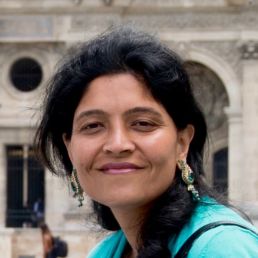Developmental Biologist Dr Ritu Sarpal’s dedication to teaching and training has earned her a position as Assistant Professor, Teaching Stream in Cell & Systems Biology, starting July 1, 2021. Her experience in designing lab courses and mentoring students will be a valuable addition to our team.
Applying to become a Professor in the middle of a pandemic was an unusual process, so when Sarpal received a meeting request from the Chair after her interview, she accepted with surprise and trepidation. However, when the faces of Chair Nick Provart and Business Officer Tamar Mamourian came onscreen and offered her the job, trepidation turned to excitement for this new phase in her career.
Sarpal started her scientific career in Chemistry at Delhi University, proceeding to a PhD in Molecular Biology at TIFR in Mumbai. She moved to Toronto to study the mechanisms by which adherens junction proteins (AJs) act as a “molecular glue” to bind epithelial cells together to form various tissues that can withstand mechanical forces during animal development.
Sarpal’s greatest research milestone so far resolved a long-standing controversy over how α-Catenin protein organizes the AJ-actin interface and contributes to dynamic regulation of adhesion between epithelial cells. In a recent publication, Sarpal identified mechanisms by which α-Catenin regulates growth pathways that control cell proliferation and cell death. Her work has contributed to an understanding of how AJs impact cancer progression and metastasis.
As a Research Associate in the Tepass lab, Sarpal has guided undergraduate project students for many years. Her advice on fly genetics and experimental design is sought by graduate students, not just in the Tepass lab, but also other labs in the Ramsay Wright building including the Ringuette and Larsen labs.
Sarpal has taught over many years for CSB’s Disciplinary Focus on Stem Cells and Developmental Biology including developing tutorials and training graduate teaching assistants for our Animal Developmental Biology course. She was also a guest lecturer in our Extracellular Matrix Dynamics and Associated Pathologies and Drosophila as a Model in Cancer Research courses. Over the pandemic, she taught online courses along with Professor Ashley Bruce, designing course material including online labs to investigate head and tail regeneration polarity in planarian flatworms and to study pattern formation in the Drosophila larval wing imaginal disc. Her student evaluations were outstanding.
Congratulations on your appointment, Professor Sarpal! We look forward to your contributions in the coming years.

